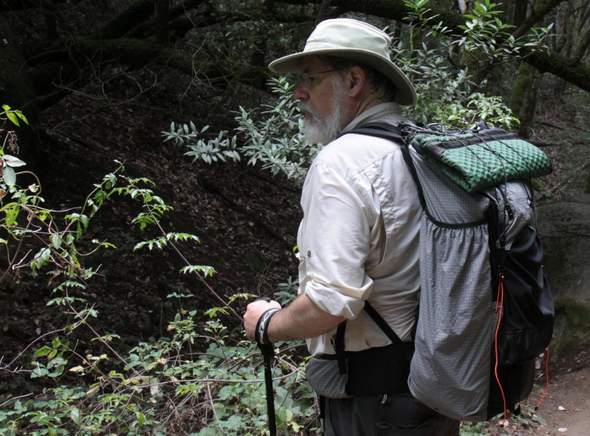Shaving a Scoutmaster's Pack Weight
Share
When I started backpacking with my son and his Boy Scout troop, I packed a lot of "just in case" items. I knew that his pack was in pretty good shape, but I was worried about other Scouts being adequately prepared. I took an extra jacket, some energy bars, a spare groundcloth, a big flashlight, and so on. Later, I heard others call that a "Scoutmaster load".

A year later, I became the Scoutmaster of Troop 14, and my worries increased, so I kept packing spares.
I never used any of that extra stuff. I watched my son and his friends building their skills and getting more capable in the outdoors, but I still worried about situations that were beyond their abilities.

Scouts putting their skills to the test
I decided to build up my own skills. I was pretty comfortable with my outdoor skills, but I needed to work on leadership and risk management. I studied training and mentoring, because Scoutmasters teach Scouts. I lightened my backpack to be more alert on the trail.
For leadership, I took the BSA Wood Badge leadership training course, watched how good leaders worked and talked with them, took a course on teaching skills (BSA Trainer's EDGE). and taught leadership to Scouts. I also read books on leadership, especially the AMC Guide to Outdoor Leadership. I made mistakes and got better at letting the Scouts lead while providing a safety net.
I worked on keeping Scouts safe. I took Wilderness First Aid (WFA), a 16 hour mix of classroom and practice. I was retroactively horrified at how unprepared I had been earlier. I've renewed the certificate three times, and used the skills more often than I would like. One Scout told me that my calm handling of his injury really hit home. He's been Philmont Ranger for three summers now.
I learned about watching weather forecasts from another Scoutmaster, a pilot. Watch two or three different forecast sources for a few days before the outing. If they converge and the forecasts don't change, you can trust them. If the algorithms keep getting different answers day by day and between sources, you need to plan for a wider range of weather. If the forecast range is outside the capabilities of your crew, you cancel. This is a judgement call, because bad weather offers the best chances for learning, but at some point, the risk is not worth it.

Sometimes an outing is not worth the risk
When there were hard decisions about risk and canceling a trip, I called on the adults and youth in the troop with lots of time outdoors. Actually, I called on them earlier, when evaluating the risks for the trip. For safety issues, we require a unanimous vote. If one of our leaders, youth or adult, is not comfortable, we don't do it. One down vote means "no". There is always another outing.
The skills I gained, were more useful than the extra gear I was carrying. I reduced my own gear to make sure that I had the energy to pay attention to risks.
I went through a few iterations on the "big three": shelter, sleep system, and pack. I started with a lighter pack, but then changed to an even lighter Gossamer Gear pack. I also upgraded to a down bag, a lighter sleeping pad, and a silnylon shelter. Through my own research and advice from other hikers I was able to update my gear without breaking the bank through clearance sales and found some used gear. I also left big hints for Christmas.
Like the big three, the rest of my load got evaluated. I weighed everything, started making lists, and asked myself some essential questions: Which fleece jacket is lightest? Does the fleece make a good pillow? Can I find lighter alternatives for my headlamp, water bottle, mess kit, or stuff sacks? Do I really need camp shoes or a tent lantern? Does a rain kilt work instead of rain pants? I had some multipurpose items such as a bandanna as a pot lifter. Could I think of others?
After ten years of intermittent improvement, my weekend pack base weight is under twenty pounds. Now I can take my DSLR, the big first aid kit, a jacket for the evening, a book, and still keep up with the Scouts. On an overnight with my wife this September, our trailhead weights were 23 and 17 pounds, with a chair, two books, a double-wall tent, and extra pots for a tasty dinner.

Scout leader, Walter Underwood, goes lightweight with a Gossamer Gear pack
I've learned that "just in case" means "I didn't plan". Planning and skills weigh nothing. Ignorance and fear are very heavy.
In the end, the Scoutmaster Load is mostly planning and skills.
"Be Prepared… the meaning of the motto is that a scout must prepare himself by previous thinking out and practicing how to act on any accident or emergency so that he is never taken by surprise."–Sir Robert Baden-Powell
"Never taken by surprise" sounds like a heavy load. It is lighter when I plan, have the right skills for the trip, and carry only what I need. It is even lighter when I make the crew partners in that. Together, we can have a safe and fun trek.

Scouts heading toward Emigrant Meadow Lake
This post was contributed by former Trail Ambassador Walter Underwood.
